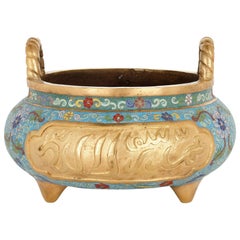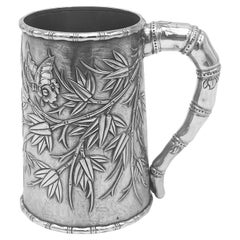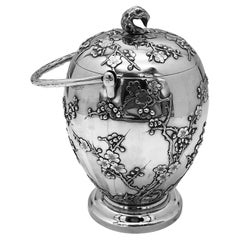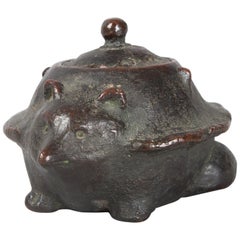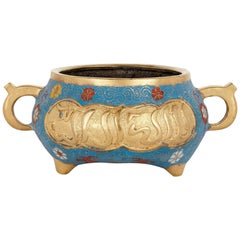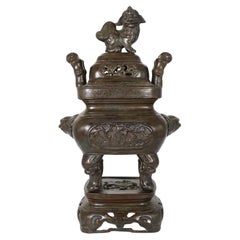East Asian Metalwork
to
200
678
301
1,130
2
2
12
5
4
4
1
1
1
80
528
522
4
284
95
34
31
5
16
7
3
4
18
2
3
1
1,113
449
306
191
173
1,542
1,134
631
460
186
1,134
1,132
1,134
16
14
5
4
4
Place of Origin: East Asian
Chinese Ormolu and Cloisonné Enamel Vase for the Islamic Market
Located in London, GB
Chinese Ormolu and Cloisonné enamel vase for the Islamic Market.
Chinese, early 20th century
Dimensions: Height 18cm, diameter 26cm
Crafted in Chin...
Category
Early 20th Century Chinese Export East Asian Metalwork
Materials
Bronze, Enamel, Ormolu
Chinese Export Silver Mug
By Yatshing
Located in London, GB
An interesting and delightful Chinese export silver mug, of double-skin construction and decorated with bamboo leaves against a matte backgro...
Category
1840s Chinese Export Antique East Asian Metalwork
Materials
Silver
Chinese Export Silver Biscuit Box
By Wang Hing & Co.
Located in London, GB
A Chinese Export Silver Biscuit Box, round with a collet foot and profusely decorated with applied prunus. against a smooth plain background. The box has...
Category
Late 19th Century Chinese Export Antique East Asian Metalwork
Materials
Silver
Japanese Bronze Koro 'Incense Burner' in the Form of a Badger
Located in Hudson, NY
Japanese bronze Koro (Incense Burner) in the form of a Badger, Edo Period (circa 1800) bronze incense burner with removable top. Badger face and t...
Category
Early 19th Century Edo Antique East Asian Metalwork
Materials
Bronze
Antique Chinese Ormolu and Cloisonné Enamel Vase for the Islamic Market
Located in London, GB
Antique Chinese ormolu and cloisonné enamel vase for the Islamic Market
Chinese, early 20th century
Dimensions: Height 10cm...
Category
Early 20th Century Chinese Export East Asian Metalwork
Materials
Bronze, Enamel, Ormolu
19th century Chinese bronze cencer with Buddhist lion decoration circa 1860
Located in Central England, GB
This large Chinese bronze censer dates to circa 1860. It is made in three parts, stand, vessel, and lid. The lid has pierced decorative panels with pine trees and a bold Buddhist lion finial for lifting.
The censer has lifting handles in the shape of bamboo to each side and again also has panels with pine forests with mythical beasts and side mounts in the form of Buddhist lion mastheads.
It is raised on four shaped legs with a beast mask head at the top and sits on the raised and pierced stand.
The decoration on this piece is all hand finished with chasing and engraving giving good detail.
The censer has a green/brown patina. Circa 1860
Censers are a type of vessel for burning incense. In many cultures burning incense has spiritual and religious connotations which influence the design and decoration of the censer.
The lion is one of Buddhism’s most potent symbols. Traditionally the lion is associated with regality, strength and power. It is therefore an appropriate symbol of Buddha who, tradition has it, was a regal prince. As Buddhist priests and monks from India, they brought with them stories of stone Asiatic lions...
Category
Mid-19th Century Chinese Export Antique East Asian Metalwork
Materials
Bronze
Pair of Chinese Export Silver Vases
Located in London, GB
Pair of Chinese silver vases with all-over bamboo decoration and each with a wavy-edge flared rim. They were made by 涂茂兴, TuMaoXing, a retailer in JiuJiang (九江), next to the Yangtze ...
Category
1890s Chinese Export Antique East Asian Metalwork
Materials
Silver
$2,721 / set
A bronze okimono depicting a study of a puppy playing with a ball
Located in Milano, IT
Bronze okimono depicting a study of a puppy playing with a ball.
The puppy has a playful and curious expression as he interacts with the ball.
The...
Category
Late 19th Century Japonisme Antique East Asian Metalwork
Materials
Bronze
$2,835 Sale Price
20% Off
Chinese Export Silver Beaker, circ 1890's
By Wang Hing & Co.
Located in Sarasota, FL
Chinese export repousse beaker, circ 1890. Wieght 3.3 oz., 4 3/8" tall
Category
Late 20th Century Chinese Export East Asian Metalwork
Materials
Silver
Pair of Chinese Export Silver Candlesticks
Located in London, GB
Pair of Chinese Export silver candlesticks with the character for "Luck" on one and "Longevity" on the other. They are attached to round wood stands.
Marked with SW, for Shing Wo, “...
Category
1890s Chinese Export Antique East Asian Metalwork
Materials
Silver
$5,102 / set
Chinese Export Silver Mug with Bamboo Decoration
Located in London, GB
A Chinese Export silver mug with a bamboo handle, and decorated with a bird and moth amongst profuse bamboo decoration on a matte background. T...
Category
1860s Chinese Export Antique East Asian Metalwork
Materials
Silver
Japanese Silver Bowl with Irises by Konoike, Meji Period
Located in Sarasota, FL
Japanese silver bowl with handles by Konike. Finely decorated with repousse irises and cast floral handles. Marked on the bottom for the maker.
Weight 272 g or 8.7 t.oz
Category
1890s Antique East Asian Metalwork
Materials
Silver
Pair of Chinese Export Silver Vases
By Wang Hing & Co.
Located in London, GB
A Pair of Chinese Export Silver Flower Vases of trumpet form, each with circular base and rising to a flared, shaped top. The vases, which are decorated with applied prunus, were ret...
Category
Late 19th Century Chinese Export Antique East Asian Metalwork
Materials
Silver
$3,401 / set
A small fine quality Meiji period cloisonné enamel vase
Located in Lymington, Hampshire
A small fine quality Meiji period cloisonne enamel vase, with silver wires and gilt rims decorated with lappets of dragons of ho-ho birds on a brown ground, with textile designs arou...
Category
1880s Meiji Antique East Asian Metalwork
Materials
Metal
Pair of Chinese Export Silver Candlesticks
By Tuck Chang & Co.
Located in London, GB
A pair of Chinese Export silver candlesticks, marked with TC, for Tuck Chang, 德祥 公记(DeXiangGongJi), a Shanghai retailer from 1901-1934, and with the maker's mark of 培记 (PeiJi).
230gm...
Category
Late 19th Century Chinese Export Antique East Asian Metalwork
Materials
Silver
$2,993 / set
A Cloisonné hexagonal potiche
Located in Milano, IT
Cloisonné potiche with a hexagonal shape, embellished with delicate floral decorations on reserves held by silver threads with geometric motifs. The lid features a spherical socket.
...
Category
Late 19th Century Japonisme Antique East Asian Metalwork
Materials
Metal
$1,417 Sale Price
20% Off
Two Chinese Export Silver Vases
By Wang Hing & Co.
Located in London, GB
Two Chinese silver vases of cornucopia form, both decorated with applied bamboo and chrysanthemum and on a circular base. The vases are similar yet were made by different silversmith...
Category
Late 19th Century Chinese Export Antique East Asian Metalwork
Materials
Sterling Silver
$3,401 / set
Owl on a Tree Stump
Located in PARIS, FR
Bronze sculpture representing an owl on a tree stump covered with ivy. The owl, detachable from its base, has shakudo eyes. It is certainly an Ryûkyû scops ...
Category
Late 19th Century Antique East Asian Metalwork
Materials
Bronze
$16,540
Chinese Bowl Adorned with Cloisonné Enamel and Arabic Inscriptions
Located in London, GB
Chinese bowl adorned with cloisonné enamel and Arabic inscriptions
Chinese, early 20th century
Measures: Height 20cm, diameter 23cm
This beauti...
Category
Early 20th Century East Asian Metalwork
Materials
Ormolu, Bronze, Enamel
Bronze Koro 'Japanese Incense Burner' in the Shape of a Rooster
Located in Hudson, NY
Bronze Koro (Japanese incense burner) in the shape of a rooster
Removable top.
Category
Early 19th Century Antique East Asian Metalwork
Materials
Bronze
Large Japanese Bronze Relief Enameled Vase, Early 20th Century
Located in Islamabad, PK
Large Japanese, Bronze Relief Enameled Vase, Early 20th Century
The vase's surface is adorned with intricate relief work that depicts a stunning tableau of flowers and birds. The re...
Category
19th Century Qing Antique East Asian Metalwork
Materials
Bronze
Large Chinese Cloisonné Enamel on brass Dish 19th Century
Located in Bilzen, BE
A large Chinese cloisonné dish with dragon decoration from the 19th century
Good condition, no chips or loose enamel parts
Diameter 36.5 cm
Cloisonné is an ancient technique for dec...
Category
19th Century Qing Antique East Asian Metalwork
Materials
Brass, Enamel
Chinese Export Silver Bowl
Located in London, GB
Chinese export silver bowl on plain round pedestal base. The decoration is of two applied opposing dragons against a plain background. The bow...
Category
19th Century Antique East Asian Metalwork
Materials
Silver
$16,329
A Japanese drop-shaped bronze vase with peonies
Located in Milano, IT
Drop-shaped bronze vase, with peonies in relief, decorated to simulate a delicate and light fabric that ends with a bow near the top of the neck.
Using mixed metals to create visual...
Category
Late 19th Century Japonisme Antique East Asian Metalwork
Materials
Bronze
$2,930 Sale Price
20% Off
Pair of Meiji Period Solid Silver Bowls by Eigyoku
Located in Lymington, Hampshire
A pair of Meiji period solid silver bowls by Eigyoku, each of lobed oval form on four scroll feet, deeply embossed with continuous chrysanthemum hea...
Category
1910s Meiji Vintage East Asian Metalwork
Materials
Silver
$26,127 / set
Chinese Floral Cloisonné Enamel and Ormolu Vase for Islamic Market
Located in London, GB
Chinese floral Cloisonné enamel and ormolu vase for Islamic Market.
Chinese, early 20th century
Dimensions: Height 20cm, diameter 23cm
This beaut...
Category
Early 20th Century Chinese Export East Asian Metalwork
Materials
Bronze, Enamel, Ormolu
Pair of Japanese Edo Period Iron Silver Inlaid Red Lacquered Stirrups 'Abumi'
Located in New York, NY
A Pair of Japanese Edo Period (1603–1867) iron, silver inlaid, and red lacquered stirrups (Abumi). Each of typical form, made of iron with silver inlay on the front with floral bloss...
Category
1690s Edo Antique East Asian Metalwork
Materials
Silver, Iron
Japanese Bronze Hawk Ikebana
Located in PARIS, FR
Bronze intended for hanging (? dô kakenanaike, « hanging bronze ») depicting a hawk, placed on a branch. The inside is hollow so a bouquet a flowers can be put inside and thus, serve...
Category
Late 19th Century Antique East Asian Metalwork
Materials
Bronze
Set of Three Japanese Bronze Vases, 1960
Located in Schellebelle, BE
Set of three Japanese bronze vases.
Measures:
high 27 cm diameter 9 cm
high 27 cm diameter 7 cm
high 21 cm diameter 7 cm.
Category
20th Century East Asian Metalwork
$2,894 / set
Japan chrysanthemum tsuba
Located in PARIS, FR
Iron tsuba in the shape of a chrysanthemum (kikugata), openworked in negative with foliage and geometric patterns. Chrysanthemum shaped tsuba were quite popular in the Edo period as...
Category
Mid-18th Century Antique East Asian Metalwork
Materials
Gold, Iron
Large Bronze Japanese Champleve Enamel Double Elephant Handle Urn Vase Japan
Located in Greer, SC
Beautifully crafted vintage Japanese urn shaped vase, featuring elephant head double handles in bronze and enamel. Colorful enamel adorns the vase...
Category
Mid-20th Century Other East Asian Metalwork
Materials
Bronze, Enamel
Chinese Blacksmith Iron Scissors on Mount, c. 1850
Located in Chicago, IL
This hand-forged metal sculpture, with its delicate appearance and whimsical shape, was once an integral tool to a 19th century Chinese cobbler’s trade. Made of iron, these scissors ...
Category
Mid-19th Century Qing Antique East Asian Metalwork
Materials
Iron
Chinese Silver Repousse and Cast Goblet by Wang Hing.
By Wang Hing & Co.
Located in Sarasota, FL
Chinese silver repousse goblet by Wang Hing. Depicts Chinese garden scenes. Drgon base with emanating fire. Marked WH for Wang HIng maker and 90 Chinese silver. Weight 7.4 oz
Category
1890s Antique East Asian Metalwork
Materials
Silver
Chinese Floral Islamic Style Cloisonné Enamel and Ormolu Vase
Located in London, GB
Chinese floral Islamic style cloisonné enamel and ormolu vase
Chinese, early 20th century
Dimensions: Height 13cm, diameter 13cm
This beautiful bowl...
Category
Early 20th Century Chinese Export East Asian Metalwork
Materials
Bronze, Enamel, Ormolu
Large Bronze Tibetan Vase with Handles
Located in Alessandria, Piemonte
Large Tibet bronze and copper vase with handles: exceptional and perfect.
Sizes: diameter at the top cm. 52, with handles cm. 61. Base 35 cm.
High cm. 43....
Category
Late 19th Century Other Antique East Asian Metalwork
Materials
Bronze
Vintage Chinese Floral Cast Iron Mortar
Located in Chicago, IL
This vintage cast iron mortar from China's Shanxi province is patterned in low relief with a simple floral design. Originally used in a traditional ap...
Category
Mid-20th Century Rustic East Asian Metalwork
Materials
Iron
19th Century Superior Quality Japanese Bronze Vase with Grape Vine Handles
Located in Hudson, NY
19th century superior quality Japanese bronze vase with grape vine handles. Beautifully shaped Edo period (first half of the 19th century) vase with c...
Category
Early 19th Century Edo Antique East Asian Metalwork
Materials
Bronze
Japanese Bronze Incense Burner 'Koro'
Located in Hudson, NY
Wood storage box.
Category
18th Century Antique East Asian Metalwork
Materials
Bronze
Japanese Bronze Vase
Located in Stamford, CT
A Japanese patinated bronze vase of outstanding color with a lotus bud form top.
Category
19th Century Antique East Asian Metalwork
Materials
Bronze
$7,800
Group of Fourteen Japanese Meiji Period Gilt Metal Plaques
Located in London, GB
Group of fourteen Japanese Meiji period gilt metal plaques
Japanese, Late 19th Century
Height 2cm, width 2cm
These beautiful Japanese Meiji period plaque...
Category
Late 19th Century Meiji Antique East Asian Metalwork
Materials
Metal
A most unusual silver and gold leaf cloisonné vase by Sukiku, 1981
Located in Lymington, Hampshire
A most unusual silver and gold leaf cloisonné vase by Sukiku, 1981, the ovoid body decorated in abstract designs with wispy silver shapes and moriage gold leaf scattered over a mottl...
Category
1980s Vintage East Asian Metalwork
Materials
Metal, Gold, Silver
16th Century Chinese Standing Bronze Figure of a Nobleman
Located in Hudson, NY
Hongzhi Period (1487 - 1505) sculpture of an important man, possibly Confucius. Comes with box.
Category
16th Century Antique East Asian Metalwork
Materials
Bronze
Pair of Antique Japanese Buddhist Temple Headdress and Necklace Ornaments
Located in Hudson, NY
Pair of antique Japanese Buddhist temple headdress and necklace ornaments. Gilt bronze with decorative stones and beads, and intricate metalw...
Category
Early 19th Century Edo Antique East Asian Metalwork
Materials
Bronze
Chinese Export Silver Openwork Dragon Bowl by Wang Hing & Co, Hong Kong, 1890
By Wang Hing & Co.
Located in Sarasota, FL
Chinese silver repousse and openwork bowl, decorated with dragons and flaming pearl. The bowl is marked on the bottom with a Chinese character, "90" for silver purity, and "WH" for W...
Category
Late 19th Century Chinese Export Antique East Asian Metalwork
Materials
Silver
Chinese Ormolu and Cloisonné Enamel Vase for the Islamic Market
Located in London, GB
Chinese Ormolu and Cloisonné enamel vase for the Islamic Market
Chinese, early 20th century
Dimensions: Height 19cm, diameter 23cm
Crafted in China...
Category
Early 20th Century Chinese Export East Asian Metalwork
Materials
Bronze, Enamel, Ormolu
Necklace of Cultured Pearls, Extra Quality 'Akoya Japan'
Located in Madrid, ES
Beautiful necklace of cultured pearls, extra quality (Akoya Japan) and amethysts.
11 mm diameter Secure clasp and 18k golden silver hinges. Long: 50 cm.
Category
20th Century Modern East Asian Metalwork
Materials
Gold
Japanese Pounded Bronze Finial
Located in Hudson, NY
In the shape of kaede leaves. Used on top of a large festival cart carried through the streets.
Category
Early 18th Century Antique East Asian Metalwork
Materials
Bronze
Set of Three Japanese Bronze Vases
Located in Schellebelle, BE
Set of three Japanese bronze vases
Measures: high 27 cm diameter 9 cm
high 27 cm diameter 7 cm
high 21 cm diameter 7 cm.
Category
21st Century and Contemporary East Asian Metalwork
$2,894 / set
Wave Bench in Mirror Finish Stainless Steel by Zhoujie Zhang
By Zhang Zhoujie
Located in Beverly Hills, CA
The wave bench designed by Zhoujie Zhang continues to implement his design philosophy of spontaneity. By applying the laws of its own gravity, the bench naturally faces downward and ...
Category
21st Century and Contemporary East Asian Metalwork
Materials
Stainless Steel
Japanese Bronze Floor Vase with Owl Figures
Located in Queens, NY
Asian Japanese bronze floor vase with 2 owls figures standing on branches with a leaf relief around a round base.
Category
19th Century Antique East Asian Metalwork
Materials
Bronze
19th Century Meiji Period Bronze Vase with Two Frogs
Located in Lymington, Hampshire
A Meiji period bronze vase with two frogs against a rough textured ground, signed ‘Hyakusei’, Japanese, circa 1880.
Category
1880s Meiji Antique East Asian Metalwork
Materials
Bronze
Pair of Chinese Wine Pitchers
Located in Dallas, TX
Pair of Bronze Chinese Wine Pitchers, with Leopard Handles
Category
18th Century and Earlier Antique East Asian Metalwork
Materials
Bronze
Necklace of Cultured Pearls, Extra Quality 'Akoya Japan'
Located in Madrid, ES
Beautiful necklace of cultured pearls, extra quality (Akoya Japan) and amethysts.
11 mm diameter Secure clasp and 18k golden silver hinges. Long: 50 cm.
Category
20th Century Modern East Asian Metalwork
Materials
Gold
A Monumental Gilt-Lacquered Bronze Ornamental Buddha Sculpture of Vajravidarana
Located in Queens, NY
A Monumental Gilt-Lacquered Bronze Ornamental Buddha Sculpture of Vajravidarana:
A Masterpiece of Sino-Tibetan Craftsmanship, Late 19th Century, Qing Dynasty
This monumental gilt-lacquered bronze ornamental sculpture of Vajravidarana is an extraordinary and commanding piece of art, showcasing the pinnacle of Sino-Tibetan craftsmanship from the late 19th century. The figure of Vajravidarana, a powerful purification deity in Tibetan Buddhism, is meticulously sculpted to embody both spiritual authority and artistic excellence.
Vajravidarana is primarily known for his role in removing spiritual impurities and negativities. Unlike other deities associated with wisdom or compassion, Vajravidarana’s function is centered on purification and healing. He is typically depicted holding a vajra and a bell, symbolizing the cutting away of delusions and the resonance of divine truth. In this striking sculpture, Vajravidarana is shown holding a vishva vajra (the double vajra), a unique and powerful variation of the traditional iconography, which signifies ultimate protection and the dispelling of negative karma.
Vajravidarana: The Supreme Purifier and Protector
Vajravidarana is revered in Tibetan Buddhism as the deity of spiritual purification, called upon to cleanse practitioners of defilements and negative influences. His vajra represents the indestructibility of truth, while his bell signifies the wisdom that resonates through purification rituals. In this sculpture, the presence of the vishva vajra, or double vajra, enhances his association with supreme protection, ensuring the destruction of all spiritual obstacles and afflictions.
The figure’s powerful yet composed expression conveys a sense of unwavering resolve and divine authority. His posture, along with the carefully sculpted details of his robes and ornaments, highlights his function as a guardian against impurity. The inclusion of the vishva vajra rather than the usual single vajra reinforces his role as a supreme protector, capable of dispelling all forms of negativity and restoring balance.
Symbolism of the Mantras and Aureole:
Unlike deities that embody wisdom through duality, Vajravidarana’s iconography is centered on purification and exorcism. The aureole surrounding him is inscribed with sacred purification mantras rather than depictions of a consort. These mantras emphasize his function as a remover of obstacles and impurities, reinforcing his role in Buddhist healing rituals.
The presence of the sacred inscriptions elevates the sculpture’s spiritual significance, making it a focal point for meditation and ritual purification. Practitioners often visualize Vajravidarana radiating purifying light, dissolving afflictions and negative karma. This theme is mirrored in the sculptural repetition of the purification symbols on the aureole, reinforcing the deity’s role as a divine cleanser.
Gilt-Lacquered Bronze: The Artistry of Sino-Tibetan Metalwork:
The craftsmanship of this monumental figure reflects the expertise of late 19th-century Sino-Tibetan metalwork, where traditional Tibetan themes were infused with Chinese artistic sensibilities. Cast in bronze and finished with a rich gilt lacquer, the statue has an otherworldly glow, giving it an ethereal, almost divine presence. The gilding process—applied with exceptional skill—gives the sculpture a striking luminosity that enhances the fine details of the facial features, flowing robes, jewelry, and other elements of the deity’s attire.
The technique employed to create this figure speaks to the high level of craftsmanship that flourished during the late Qing Dynasty and early modern Tibetan art. The ornate details of the robes and the fine texture of the sculpture highlight the exceptional skill of the artisans who brought this work to life. The use of gold and lacquer not only reflects the preciousness of the sculpture but also its spiritual significance as an object meant to inspire reverence and meditation.
An Ornamental Sculpture of Monumental Scale:
Unlike smaller devotional objects, this sculpture is designed as an ornamental masterpiece, intended to make a grand visual and spiritual statement. Its monumental size allows it to dominate any space, offering a commanding presence that is both physically and symbolically impressive. In Buddhist practice, large sculptures of this nature are often placed in temples or meditation halls, where their imposing size and serene presence would encourage contemplation and devotion.
The grand scale of the statue further amplifies the spiritual power it is meant to convey. As a representation of Vajravidarana, it is not only a physical object of beauty but also a conduit for meditation, purification, and enlightenment. The scale of the sculpture also emphasizes the divine stature of the deity, highlighting his importance in the Buddhist tradition as the ultimate force for spiritual cleansing and protection.
Provenance:
Acquired in China in circa 1900
1905 Private Buddhist Temple, Northeast, USA
Private Sale
Solomon Treasure...
Category
Late 19th Century Tibetan Antique East Asian Metalwork
Materials
Bronze
Recently Viewed
View AllMore Ways To Browse
Totai Shippo
Chinese Brass Incense Burner
Copper Persian Tray
Indian Brass Charger
Turkish Copper Pot
Brass Dallah
Burmese Bell
China Brazier
Foo Censer
Japanese Meiji Period Solid Silver
Meiji Bronze Eagle
Ming Chinese Cloisonne
Qajar Engraved
Shakudo Vase
Arabic Coffee Pot
Chinese Cloisonne Incense Burner
Elephant Incense Burner
Islamic Incense
